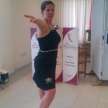Am I 'Disabled?'
Changing the Terminology We Use

Disability. When you hear this term, what is the first image that pops into your head? Someone in a wheelchair? Someone who is blind? What emotions do you feel? Sadness? Pity? Relief that you don't have a disability? Or rejection of the term "disability" in regards to yourself? Do you make assumptions as to what the "disabled" person can and can't do?
What about the slurs that we make? Comments like this, "Seriously, are you deaf? I've been calling you." "Is he blind?!?! How could he have missed the ball!" And one that I almost hesitate to use because of how sensitive it is, "What a retard." These comments make a mockery of other people, using what is part of them as a slur against a so-called 'normal' person.
The term "disability" is confusing. And the way it is used is also confusing. Why is someone with hearing aids considered to have a disability but someone with glasses is not (and I'm not talking about those who are deaf or blind. Just those who may have some level of hearing or vision loss). What level do you have to reach to be considered "disabled?" And then we have visible and invisible disabilities, such as the difference between someone in a wheelchair and someone who has a learning disability.
There are many groups who reject the term, "disability." For instance, the Deaf community does not consider themselves as having a disability because, if they are given the right support, they can do anything a hearing person does. I can relate. As someone who is hard of hearing, I have never considered myself as having a disability. That term seems to conjure up images of someone in a wheelchair (so, I have my own biases and set of assumptions around that term). Many other people call themselves, "differently-abled." There is a whole set of stereotypes and assumptions around the term that people want to distance themselves from.
Many people also fight against what they call "inspiration porn." I'm sure you've seen the memes and the videos. The video of the homecoming king dancing with the girl with Down Syndrome. A fast food worker helping feed someone with Cerebral Palsy. Someone with a disability getting applause for doing something most people would consider ordinary. While those videos may be heartwarming, there are a couple problems. Let's take the first two examples. The attention and praise is focused on the "normal" person. The person with a disability becomes an afterthought or sideshow. And it is seen almost as extraordinary that someone who was "normal" would help someone who was different. We don't stop to think about the feelings of the other person. Maybe the person with Cerebral Palsy would not like that video being circulated on social media. We all have struggles and weaknesses and moments like that may feel personal and somewhat private. To have that video circulated around takes away from the dignity of the person and their right to privacy. If we spilled something on ourselves or slipped and fell and someone came to help us, we would not like pictures of it spread over social media, praising the person who came to help us. Why would we think it's okay just because the other person in the video has a "disability?"
In the case of the other video, with people getting applause for doing something ordinary simply because they have a disability, let's be honest with ourselves. Yes, we should celebrate the triumphs of all people. But, when we watch these videos, we may often feel a mixture of pity, relief and superiority (a blend of "there for the grace of God go I" and 'Thank God, I don't struggle with that"). Let's face it. People generally don't want to be singled out and they don't want to be pitied. Instead of using a video to feel good about ourselves, let's take time to get to know these people. Why don't we ask them how they want to be represented and let them represent themselves?
So, I propose that we remove the term "disability" from our general vocabulary. In doing so, I am not suggesting we remove any sort of assistance from those who need it, such as the "Americans with Disabilities Act." But, just that in our general usage, we stop referring to people as disabled and we take a hard look at our own stereotypes and biases when it comes to that term. In general, that we focus on people themselves, rather than focusing on the disability. That we be mindful of the way we talk and the terms we use, in regard to how they may sound to other people. That we get to know people so we can see them as "Carla" or "Jim" rather than a person in a wheelchair or someone who is deaf. And that we allow people to represent themselves and speak for themselves and their community rather than us trying to impose our own ideas of how they should be or act. When we act with compassion and understanding, we can go a lot farther in making the world more equal and fair than when we remain rooted in our own beliefs and misconceptions. And when we reach out, we may find some beautiful friendships.
About the Creator
Jenny Beck
I am a chiropractor, health advocate and advocate for the Deaf and Hard of Hearing community. I love to travel and spent several years working overseas in Indonesia and Ghana. @aslchiro- Instagram






Comments
There are no comments for this story
Be the first to respond and start the conversation.